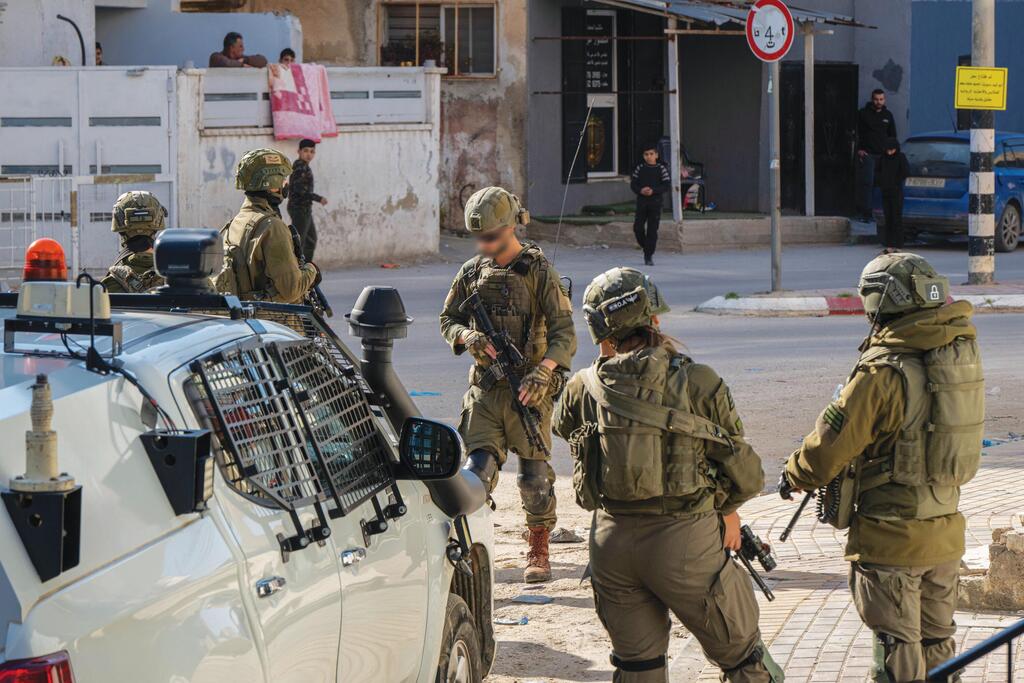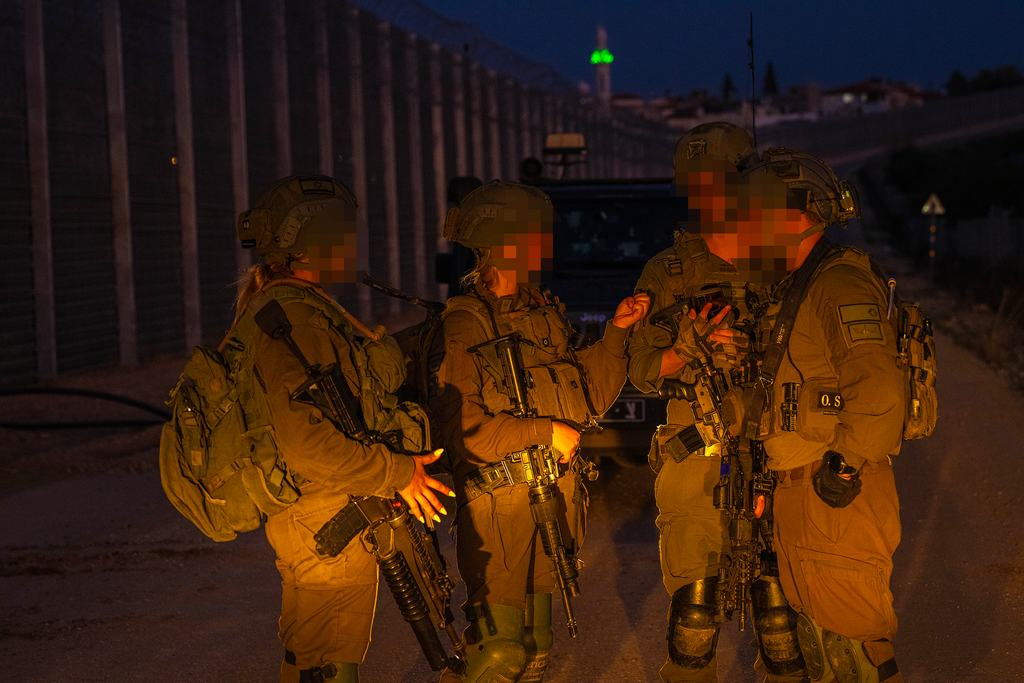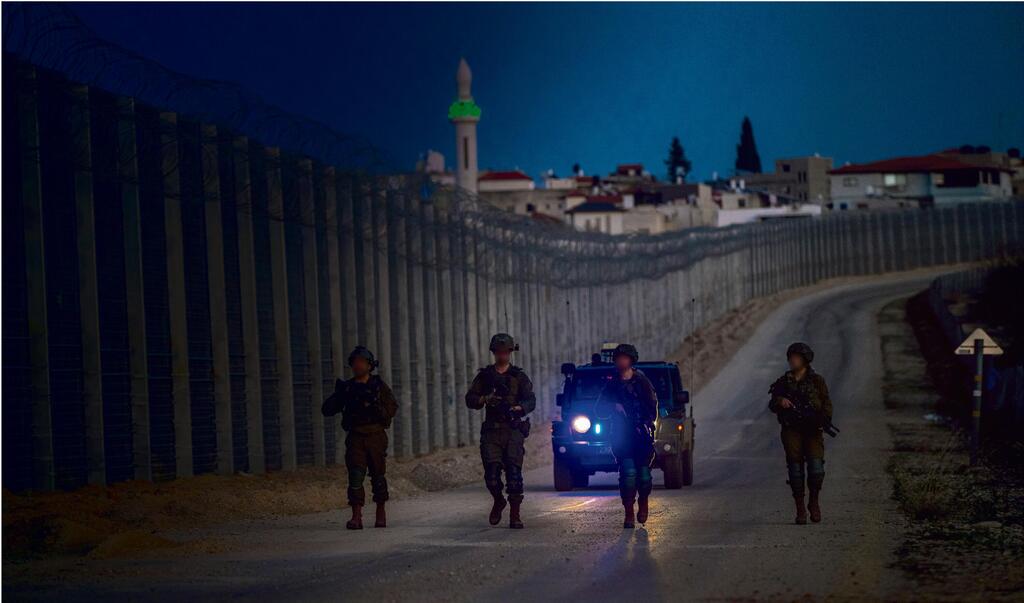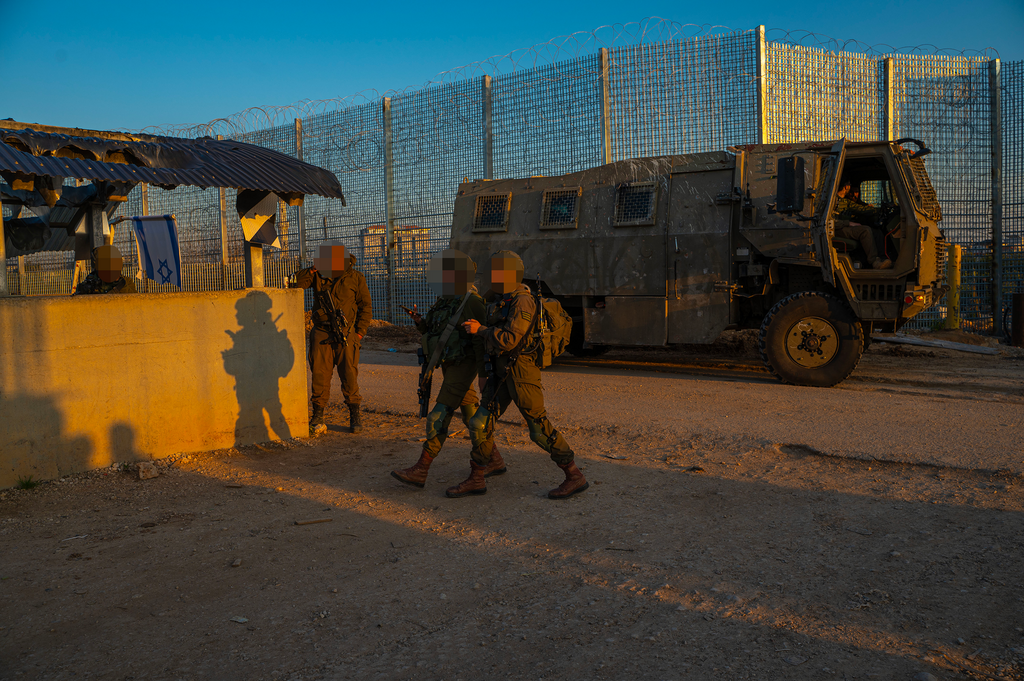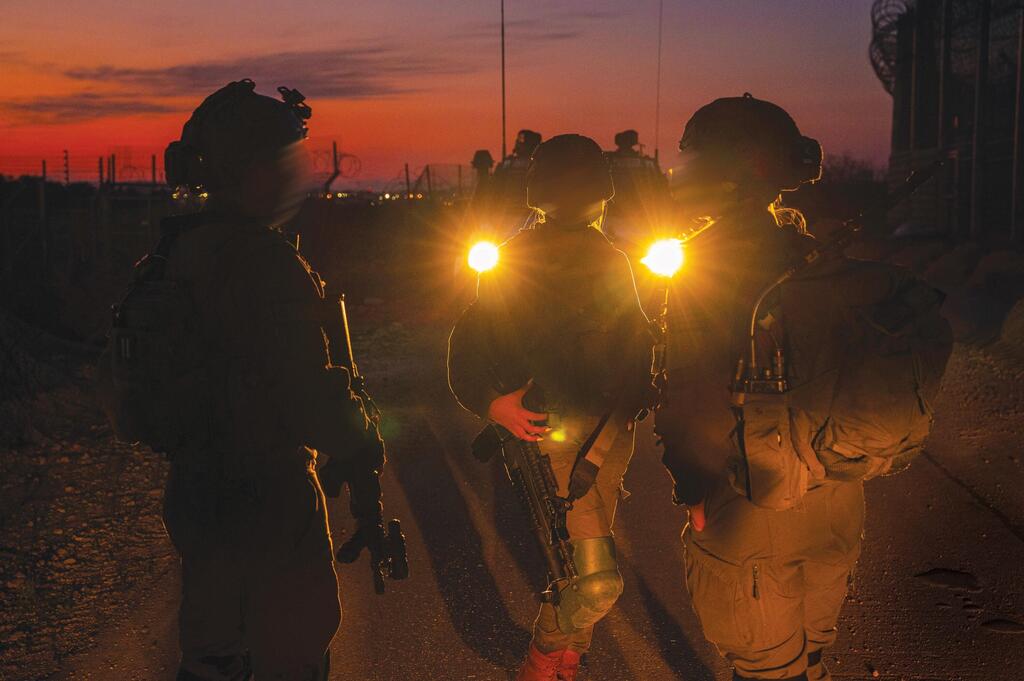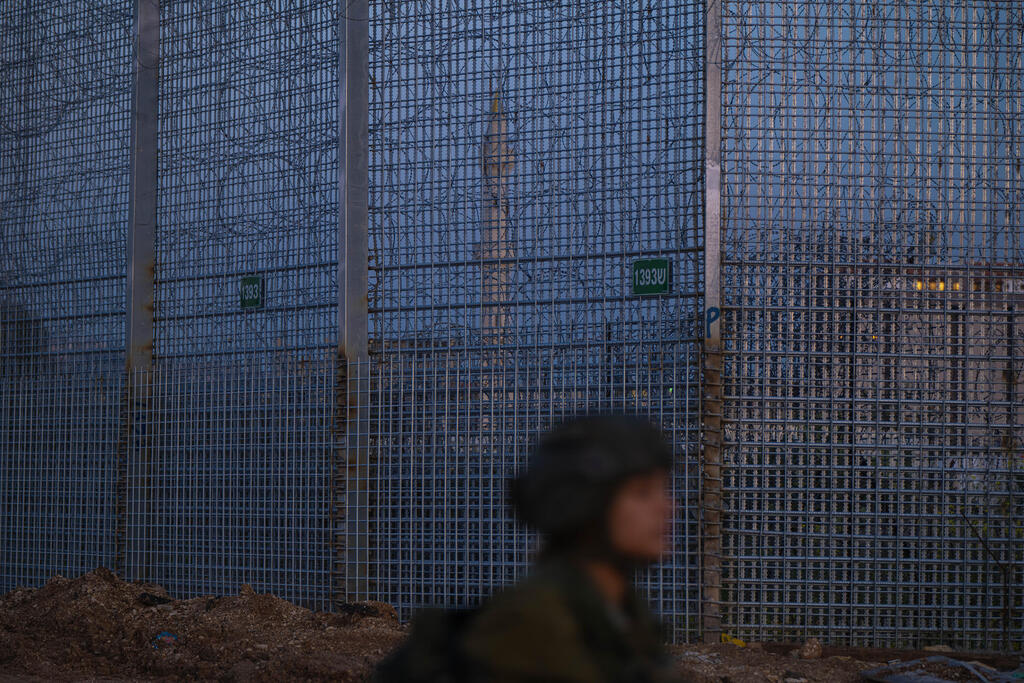If looks could kill, I wouldn’t be here now. That’s what I’m thinking as two young Palestinian men raise up their heads and look me straight in the eye. The sheer degree of blatant, overt hatred in their gaze actually confuses me.
It takes me a moment to remember that I’m wearing a helmet and a bulletproof vest. From where they’re standing down the street, they probably think I’m an IDF soldier observing them from the rooftop where I’m standing. It’s just that I’m not a soldier at all, and my helmet makes me look about as intimidating as Bob the Builder. And as for how much badass I was putting out, I might as well have been wearing a cream puff on my head.
I’ll be the first to admit it. I’m scared right now. That gaze of theirs takes me back to something Liri Albag said about how her most lucid memory from the terrible morning of October 7 was the look in the terrorists’ eyes as they entered the shelter—“A look of pure evil." One of the guys is gaunt and skinny. I can even make out his Adam’s apple from here. The other is muscular, wearing a black T-shirt with some Arabic writing on it. It wouldn’t surprise me if it’s Hamas merchandise.
Until these two adorable gentlemen gave me that look, I thought they were just a couple of locals sitting on the sidewalk, soaking up the sun. We’re in Ramadan and the village menfolk aren’t going to work. Not that they’ve been working much lately anyway. Ever since the West Bank turned into one great, big, boiling barrel of explosives, hardly any work permits into Israel have been issued to the villagers.
"And that in itself is a dangerous incentive for them," says Maj. A., the mixed-gender Panther Battalion’s extremely impressive operations officer. For them, it’s "no permits, no work, no money. Let’s launch an attack."
These girls aren’t kids but rather tough fighting machines
If only I were one of those fabulous, heroic female fighters from Panther I met earlier on, maybe then I’d be less afraid. When I first met them in the living room of the house serving as the battalion’s headquarters, they looked like kids to me. They seemed like a charming group of 20-year-old girls who just wouldn’t stop cracking jokes.
Only when we start talking about what their service entails, do I realize that these girls aren’t kids but rather tough fighting machines. They don’t so much as flinch when they’re woken up at 3 a.m. and sent to a darkened house to extract the terrorists hiding there. For these young women, and the men serving alongside them, danger lurks around every corner - even during the most routine patrols.
"Most of the time, we’re dealing with disturbances - regular riots," Sgt. R, a female battalion soldier tells me. "You know, they throw stones and burn tires. Okay, we got used to that quite quickly. But then, during an operation in Qalqilya, they actually shot at us. We were walking down the street when we heard an explosion and saw gunfire sparks. That was the first time I’d been shot at my whole life."
And you weren’t scared?
"No. In my combat training, I learned to counter regular instincts in dangerous situations. Rather than freezing or running away, my body wants to charge forward, and I love it. That’s precisely why I’m here - for the danger and adventure. Storming into a house in the middle of the night and finding a weapons cache big enough for three separate terrorist attacks, or operational activity deep inside these villages, is what we all live for. We really need that action. Otherwise, it’s just rather dull."
The Panther Battalion had until now been stationed deep inside Qalqilya. Those two weeks entailed so much danger and action that each and every soldier in the unit tells me they already miss it. At dawn yesterday, they deployed to a village with one of history’s most fitting names: Kafr Hableh, as in "mechablim" (terrorists).
The Palestinian village of Hableh is south of Qalqilya, right on the West Bank security fence. Being so close to the border means it’s regarded as what Maj. A terms a "springboard village."
"Hableh is the West Bank’s westernmost village, a mere 400 meters as the crow flies from Highway 6, Kfar Saba and Alfei Menashe. A ‘springboard village’ means that all things bad and dangerous find their way here. Guns are smuggled in and hidden in these houses, and terrorists set out from here to carry out attacks. You have to be particularly alert in the dead of night: If just one patrol loses sight of an infiltrator - even for even a split second - they can cross the fence and be inside Israel in a matter of seconds. Just last week, we had three infiltration attempts. It’s fine though. One precision shot to the ankle of an infiltrator, and he’s dead."
The house that became a command post
Truth be told, Maj. A. had explicitly warned me not to do what I just did - step to the edge of the roof and look down onto the street.
"Not a good idea," he said. "We’re in the middle of a very hostile Palestinian village, and this rooftop is completely exposed to snipers."
I should have listened to him. My curiosity got the better of me though. This is my first time inside a Palestinian village deep in the West Bank. I served in the Air Force. The only Green Line (the boundary separating the West Bank from Israel proper) I ever saw was that of my neon green marker. Major A. describes the village as a "hornet’s nest and terror stronghold." I’ve been dying to see what it looks like ever since we got here. In what kind of houses do the villagers live? How do they go about their daily lives? When they’re not busy with their primary hobby of the “Death to Jews" club, that is.
And of course, as a fan of bargains, I’m most curious to see what kind of stores they have here in the village. Is there a clothing store? A greengrocer? A good shawarma joint? I woke up this morning starving, and I’m imagining they let me go out to dip some pita into some authentic terrorist hummus.
I quickly realize, however, quite what an idiot I am for imagining they’d let me go wandering around the village like a keen tourist. For starters, we showed up here in an armored vehicle bedecked with slat armor. On the way in, I tried twisting my neck around to see the view, but all I could see were the green eyes of the soldier sitting across from me - the only part of him visible through the black face mask covering his whole head.
On the way, I try directing the conversation to hummus. He just says, "Hummus? What are you talking about? We eat army rations we bring with us. We’re not allowed to mix with the locals."
We continue rattling along in the armored vehicle-bouncing-blender. We then come to a sudden halt. "We’re here," says Maj. A., pointing at the house in front of us. "Welcome to our 'Hableh Battalion' headquarters."
"Maybe I can take a walk around the village first, just to get a feel of the place?" I ask. "You don’t just go walking around here," he says, barely concealing a smile. "Every step you take outside, you’re accompanied by armed soldiers."
We go into a rather nice-looking square-shaped three-story building. It could have been an apartment building in Givatayim had they not painted the wall in the middle of the house in horrific burgundy. Until not so long ago, this house was legally inhabited by a Palestinian extended family. The Panther Battalion showed up and made it their headquarters. This is where they sleep, brush their teeth and set out from for their daily and nightly operational activities.
“I don’t get it,” I say to Maj. A. “Where did the family that lives here go? Did they simply rent you the house?” The officer responds, “Whenever we show up in the West Bank for a few weeks of operational activity, we select the most central house, overlooking important spots. We tell the Shin Bet which house we’ve chosen, and that’s it. We get it.”
I confess feeling kind of sorry for the family whose home had been commandeered. It’s odd as, ever since October 7, I haven’t felt the tiniest shred of compassion for any Palestinian. All I’d been feeling was a burning desire for revenge coupled with rage running through my veins like a boiling black river. But standing in front of this house, whose owners had been thrown out simply because it had been crowned a strategic property, I suddenly wonder how it must feel to be told that, as of now, you have to donate your home to the very people you hate the most.
7 View gallery


Dana Spektor (second from left) and Panther Battalion troops in Kafr Hableh
(Photo: Yuval Chen)
A huge boom coming from the roof cuts off my train of thought and scatters a flock of terrified pigeons. You’d never believe how many thoughts can run through your mind in a moment of excessive anxiety. I have time to think that I should have listened to Major A. who told me not to go near the edge of the roof. I’m now sure I’ll be the first to get sniped. I also consider running to hide behind the water tank and let the Panther Battalion professionals return fire. I’m surprised to see Major A. and the five soldiers he’s with haven’t even bothered to take a hiatus from their lively conversation.
"What was that?" Major A. is so indifferent I literally have to tap on the shoulder to get his attention. "Oh," he says, "It’s nothing. Just a stun grenade. It just makes a noise. No need to worry."
I’ve been here for sixty minutes and can already see that Hableh is no quiet, unassuming village. It’s enough to make me forget the guilt I’d felt about the poor family whose home had been commandeered by the IDF. What’s the alternative? Letting the villagers live here with no military presence when it’s obvious they’re stockpiling storehouses of weapons or smuggling terrorists en route to committing terrorist attacks?
This is the convoluted reality faced by the Panther Battalion each and every day. On the one hand, they’re sent to serve in the very heart of a civilian population. They have no choice but to break into homes in the dead of night, deal with crying babies and terrified grandmothers while still retaining their humanity. On the other hand, Hableh is by no means as innocent as they would like you to think it is. "You should know, Hableh has the most weapons," says Major A. "They’ve got it all here - pistols, improvised Carlo submachine guns, even M4s stolen from the army. I’ve no idea how they got their hands on weapons like that."
Is no one innocent here?
"As far as I’m concerned, everyone here is a terrorist. I’ve never stopped to think how many of them are terrorists and how many are simply uninvolved civilians. Even the most uninvolved civilians here are doing favors for their neighbor planning terrorist attacks, storing bags for them in their homes."
He stands on the edge of the roof and talks me through all the Israeli communities we can see in the distance. Pointing, he says, "Look. See those rooftops close by? That’s Alfei Menashe. There, down below, that’s Highway 6. See those cranes? That’s the Kfar Saba industrial zone."
What? Just a second ago, I was standing at Nordau train station in Kfar Saba - just where you’re pointing. I was looking around at the view. I had no idea that what I was seeing was Qalqilya.
"Precisely. People don’t realize how close the West Bank is to them, how little it would take for them to invade Alfei Menashe, Kedumim, Ramat HaSharon, Kfar Saba or Petah Tikva."
It turns out that while we’re sitting at home arguing about a TV reality show, there are dangers so close by. This immediate proximity to Israel is the very reason this new battalion was set up three years ago. Yes, there was a military presence here before Panther arrived – primarily reservist battalions and soldiers on operational duty. What was lacking, however, was a single consistently posted battalion that knows the sector – or as Maj. A. calls it "an authority battalion."
What does that mean?
"An authority battalion is one stationed here permanently, that knows the area so well that it becomes a ruling power on the ground. That’s why Panther was created. It followed a period of incessant terrorist attacks coming out of the West Bank. The attack at the Sarona Market in Tel Aviv came out of here. Attacks in Ramat Gan, Petah Tikva, Eilat - everywhere. So, they decided to beef up security along the seam line and not rely solely on temporary battalions. We take up positions in various hostile villages here. The idea is to establish as much presence as possible deep within the village, in their daily lives."
And does that deter them?
"Very much. It’s hard to believe how effective it is. Take today: when we entered Hableh, we could see the fear in their eyes, the complete shock that we dared come into their village. And we didn’t enjoy it on a personal level. We’re constantly reminding ourselves of the IDF’s values. But what can we do? That fear is the very core of our deterrence. They need to sense it to remember that we are the sovereign power, and that they shouldn’t even think about carrying out a terrorist attack.
“And there’s yet one more challenge right now. As part of the hostage deal, we released back to them lots of terrorists of the worst kind. The deal is a blessing, and all of us in the battalion are happy that the hostages are coming home, but in our hot sector, we can’t forget that, at the same time, terrorists are being released right back into our sector.
'The boys serving here are like brothers to me. They’ve seen me in at my sweatiest and grubbiest. They don’t care. And anyway, the boys don’t shower much either. We’re family here.'
“We haven’t yet encountered any of the terrorists released since the deal, but we saw the celebrations in the villages as they were about to come back. These aren’t children’s birthday parties. These are armed men roaming freely, firing into the air and we’re the ones who have to track them down."
So, what do you do?
"We go to the terrorists' families the night before their release. We knock on the door and tell them, ‘We’re warning you. Don’t let anything happen tomorrow that we won’t like.’ And they don’t dare argue. They have a certain respect for us and for the IDF. I understand that not everyone’s interested in putting on a show of force. Some are genuinely happy that their brother or cousin is finally out of jail. But I don’t care what kind of happiness it is or what part of their heart it’s coming from. As far as I’m concerned, it can’t be displayed. They can celebrate at home: make a cup of coffee, slaughter a sheep. I don’t care. Not outside."
We walk down the stairs and back into the house. The first thing you notice is how quickly the house was abandoned. It has two floors and dozens of rooms. This is not an exaggeration. Some of these rooms are now occupied by soldiers curled up head to toe inside their sleeping bags. They arrived in the village last night, meaning they went to sleep at dawn.
"We’re not allowed to touch the civilian belongings in the house," explains legendary deputy company commander Lt. A. "When we come to sleep in an outpost (a term for a commandeered house), we don’t use anything that belongs to them. We don’t use their sheets or blankets. We bring our own mattresses and sleeping bags."
'The boys serving here are like brothers to me'
The blend of a Palestinian home and an improvised battalion headquarters is evident everywhere. Someone had put up a piece of paper on a door and scribbled on it “Company Sergeant’s Office." It’s really just army equipment someone had put on shelves next to toys and clothes. The soldiers’ smoking area is in the right-hand side wing of the house on a half-built floor the family never finished - meaning you stand there smoking among the scaffolding, just a foot away from a pink toddler scooter some child left behind.
In the adjacent living room, a group of soldiers is discussing the day’s schedule under a gaudy chandelier with gold lily-shaped bulbs.
"Terrible design," I say, pointing at a glass candlestick decorated with fake diamonds. "This is nothing," says one soldier. "You haven’t seen Tulkarm. We were in houses you wouldn’t believe people actually live in. The worst house we stayed in had no shower or bathroom."
What did the female soldiers do? Sorry to sound sexist, but it’s harder for women without a bathroom.
"We used bottles. Bags if we had to."
And what about showering?
"We didn’t shower the entire time. When I finally got home, I showered for three hours straight in boiling water."
“We don’t shower here much anyway, even in the houses that do have running water. We’re busy with operational activity 24/7. We don’t have time for that. And even if we do, it’s not part of the atmosphere here. The boys serving here are like brothers to me. They’ve seen me in at my sweatiest and grubbiest. They don’t care. And anyway, the boys don’t shower much either. We’re family here. You’re in no position to judge. We’ve all been fighting. It doesn’t mean anything.”
The battalion question – for or against - has been a controversial topic in the media and online in recent years. Whenever the idea of drafting ultra-Orthodox men into military service comes up, countless religiously inclined online commenters pop up asking “But how can you guarantee we can keep up our modesty rules? Have you seen the Sodom and Gomorrah in the mixed battalions?” And now, with the male and female soldiers lounging around the living room sofas eating chocolate spread sandwiches from army rations, this is the very opportunity to demonstrate what the political argument looks like in real life.
Let’s start with the fact that the army makes sure boys and girls are housed in separate dormitories. Even here, in the heart of a village, in the midst of operational activity, far from any NCO checking up on discipline—that separation is still strictly maintained. In practice, there’s not a “Girls Dormitory” sign on Earth that could divide this amazing battalion with its fantastic camaraderie. They’ve been fighting shoulder to shoulder for so long that they’ve become a tight unit where your body structure means nothing. And the rules about leave have been among the toughest since Operation Iron Wall kicked off. They spend 17 days in the army, followed by a meager four days at home.
'They’re the very best. They’ll have pushed as hard as they could to reach combat fitness. Soon enough, the guys realize that serving with women is a whole different kind of privilege.'
“I see the boys here like my brothers,” says a female soldier. “They know everything about me. They’ve seen me facing the hardest things. I’ve got friends for life here.”
This camaraderie is extremely moving - especially when you think back and recall that things didn’t start out so smoothly. Resistance to mixed-gender battalions almost always comes from the male side. "That’s my greatest challenge as a commander in charge of training," says Lt. A. "Most of the guys here were originally aiming for other units, and they think that serving in a mixed battalion means they’re in some way less capable. Very quickly, though, as we engage in more operational activities, we manage to convince them that fighting alongside women is every bit as forceful and aggressive - if not more so. And the women here? They’re the very best. They have pushed as hard as they could to reach combat fitness. Soon enough, the guys realize that serving with women is a whole different kind of privilege. I’ve had so many guys come up to me and say, ‘I was wrong. I get it now. This is an amazing experience.'"
"It’s mostly because of stupid stereotypes," admits one of the male soldiers. "I’ll be honest. When I was told that I’d been assigned to a mixed battalion, I was still kind of macho and chauvinist about it. All my friends who’d gone to the Golani Brigade made me feel like serving with women was somehow less prestigious. All that vanished into thin air after our first operation. I saw how fearless the women were in that first search operation. In combat, you gauge a person solely on their abilities, and girls’ level here is just as high as ours. Sometimes higher."
I finally muster up the courage to ask the awkward question: "Are there romantic relationships in the battalion?" After everything I’d heard about camaraderie and gender-blind friendships, I’m sure the answer would be no. I’m taken aback when everyone starts talking at once, shouting, "Of course!" One soldier points to a group of three female soldiers sitting together: "Her, her and her - they all met their boyfriends in the battalion."
"You throw a bunch of young men and women, at their peak of adolescence, into one place, close them off together, and you’ll obviously be getting romances," says Sgt. Maj. R. "You’re stuck with the same people for 17 days straight. Of course, things are going to happen."
"I always say - if a guy has seen me in the situations I’ve been in here, and is still attracted to me, it has to be true love. It’s a great filter in fact. If a guy falls for me like this – after an operation - without a shower, he’s seeing the real me."
And what do you say to those who are against mixed-gender battalions, saying that women bring down operational capabilities?
Sgt. B.: "The results speak for themselves. I know how I perform under fire, so I’ll keep doing my thing, and they can talk all they want."
Sgt. G.: "I don’t even know what argument you’re talking about. I think we’ve gotten past stories like Alice Miller (who fought to open the IDF pilot course to women). After October 7, people saw what crazy capabilities female fighters have."
Do you have any problems when it comes to physical fitness?
Sgt. N.: "There are biological differences, I won’t deny that. But what really matters is my mental and physical resilience under pressure and my operational combat fitness, and on that front, I can assure you that the girls are just as good as the boys. We work hard to maintain the highest combat skills. You won’t find a woman who dreamed of becoming a fighter who didn’t push herself three times harder during training to be the best she can be."
And perhaps that’s the best response to anyone saying integrating men and women into combat roles weakens operational efficiency. Here’s a partial list of the Panther Battalion’s achievements since its formation:
In October 2023, the Panthers intercepted and killed an armed terrorist on his way to carry out a terrorist attack in Tzur Yigal. In April 2024, the battalion discovered a huge weapons cache in this very village. A few days later, they returned to Hableh, captured armed terrorists and confiscated yet more weapons. In August of that year, they killed a terrorist attempting to throw an explosive device at the Eyal checkpoint, and in that December, the Panthers captured Qalqilya’s smuggling operations chief - one of the West Bank’s most wanted smugglers.
"We’ve had no casualties so far. Let’s hope it stays that way," says Maj. A. "But this is definitely not an easy posting. One of our sector’s most dangerous neighborhoods is Qalqilya’s Kfar Saba neighborhood. Why is it called that? Because it overlooks Kfar Saba in such a way that one sniper from a rooftop, and we have an attack. There are lots of terrorists in that neighborhood who are incredibly hard to catch. But when you live inside the neighborhood, as we do in Panther, you can get to their families."
Do your parents know what you’re doing here?
Sgt. Maj. L.: "Oh my God, my mother doesn’t sleep at night. My family bombards me with questions when I’m home. I can neither confirm nor deny anything."
Sgt. Maj. A.: "I’m a lone soldier. I made Aliyah from New Jersey. I’m the first of my whole family to live in Israel and the first to serve in the army. I’m also an only child to a single mom, so it was naturally quite involved when I told her I wanted to be a combat soldier. She agreed though. What choice did she have? She‘d hosted soldiers in our home for years, so I grew up seeing them. That’s where my dream to serve came from. Now she worries about me. It’s hardest on my grandfather. He says I’ve given him yet one more reason to stay up worrying at night."
The Social Media Queen of Tulkarm
I’m with Sgt. Maj. I., a charismatic young woman with a honey-colored ponytail, along with another few soldiers, at the Hableh-Israel border. At five o’clock, we’re supposed to conduct routine activity known as the "Opening of the Gates." Right now, the two of us are just waiting on a bench. The border fence is at the western edge of the village, next to the new neighborhood full of luxurious grand villas – the kind I can only dream of. I call it "Hableh Hills."
Not far from here, I lucked out and got to see the local café. It looked like a rat-infested New Delhi bodega, inspiring me to sample nothing at all. “You might ask why there’s a café 500 meters from the borders,” says Maj. A. “Why would you have a café overlooking the fence? We have intelligence that there’s smuggling going on from here.”
Why did you want to serve in a combat position?
Sgt. Maj. I.: "I’ve been hyperactive since I was a kid," she says. "I never thought I’d do anything else, certainly not work in an office. I always knew I’d be a combat soldier, that I’d go where the action is and do something important for my country. We really are protecting Israel’s towns and cities. It’s not just a cliché."
She’s been serving in the Panther Battalion for two years and has been there for every major operation, but nothing had prepared her for what happened this year, — becoming a sensation on Palestinian TikTok or, as she calls herself—"The Social Media Queen of Tulkarm."
She opens up her phone and shows me a TikTok video of herself standing in the middle of a crowded West Bank street surrounded by men and women glaring at her with that hostile gaze I can now spot. I ask about the video.
"This one’s from Al Jazeera," she says. "We set out one day from our base in Tulkarm and saw a crowd of journalists. The Palestinians wanted to make some international noise about the IDF operating there, so they brought in the media to film us. This is yet one more way for them to harass us, signaling to us that they’re going to “tell on us to Europe.” The whole situation wasn’t easy. They were obviously trying to provoke us into responding in a way that would make us look bad. They were constantly testing us. Some got too close to us. Others showed up with Palestinian flags.”
I. is a strong-willed young woman. It’s truly impressive to see how she’s handling becoming a viral sensation in every Qalqilya terrorist den. But she’ll be the first to admit that being widely shared on Al Jazeera’s Telegram and TikTok channels isn’t the best thing that has ever happened to her.
For starters, you really don’t want to become a Zionist symbol and the object of Palestinians' revenge. Then there’s the fact that she’ll be discharged in less than a year. What will then happen when she travels overseas? The internet is full of incriminating evidence to help "Free Palestine" activists track her down. “It’s a professional liability,” says I. “I love being a combat soldier so much. I’ll cross that bridge when I come to it.”
I tell her that I felt uncomfortable watching the video filmed by the Palestinian cameraman. The way his lens captures her and how he follows her crossing the street conveys something akin to infatuation. This video is, of course, one of hatred. That said, there’s something objectifying about it.
“Basically, they did a full photoshoot,” jokes I., trying to lighten the mood. “They filmed me from every angle. And look down here - 95,000 likes, all from my Palestinian fans.”
I saw some men on the street looking at you in a way that didn’t feel right to me. They don’t harass you, right?
“No way. They wouldn’t dare.”
As we said, we’re here for the “Opening of the Gates” and we’re now watching the three female soldiers who are supposed to carry out this daily operation. Some villagers still have work permits for jobs in a greenhouse across the fence: They cross the border each morning to the greenhouse and come back home at around five or six in the evening. Every entry and exit for work purposes demands crossing the checkpoint manned by the Panther Battalion. They present their ID cards and wait for the computerized system to check they’re not in Israel unlawfully.
Get the Ynetnews app on your smartphone: Google Play: https://bit.ly/4eJ37pE | Apple App Store: https://bit.ly/3ZL7iNv
For reasons unknown, today’s gate-opening ceremony is delayed. If I had a wager to guess, I’d say it’s something to do with Maj. A. being called to a stone-throwing incident at another point along the fence a few minutes ago. He mentions there were likely some injured. The delay causes a backlog of workers waiting on the Israeli side of the border. An endless line of workers eager to get home and take a shower has been standing along the path in front of the checkpoint for 40 minutes. The only thing keeping them from their rest is soldiers and a fence.
To the Panther Battalion’s credit, they’re brilliant at maintaining order. They act morally, but you can’t miss the steel determination in their expressions. No one dares try anything reckless with them. This is why none of the dozens of workers waiting in line dares so much as to whisper a complaint. I know it’s unintentional, but the men silently standing here in a long line, probably feel humiliated.
That’s what’s troubling me right now. Following the massacre, fresh hatred, envy and thirst for revenge must be building up in the heart of each and every held-up worker. Even the most extreme right-winger would have to agree that there are dangers in ruling over an entire population like this. Controlling a village means, as I earlier witnessed, not letting three elderly women in hijabs walk to a friend’s house because today, the IDF decided it’s not allowed.
“Maybe that’s why it’s good that there’s a mixed-gender battalion here,” A. says. “Women approach sensitive situations differently. When we go into a house to clear it, we bring all the occupants downstairs and tell everyone to present their ID. I’ll immediately notice the women and girls. It’s the middle of the night and they’re not dressed modestly. I can see on their faces that they want to put on their hijabs. I understand the situation and let them.”
You’re saying you feel their humanity?
“Yes. If a woman asks me for water, I’ll let her take some, but I’ll go with her. You can’t trust anyone. Do you get it? Even in my humanity, October 7 is always there. I’m always on high alert. I’ll never stand with my back to anyone.” It’s the hardest with small children. They’re really not guilty of anything.
“This week, we went into a house with lots of babies and little kids. The guys don’t get it as much. They’re less sensitive to the situation. I told them, ‘First of all, be quiet when you walk in.’ We then put all the children and babies in one room so they wouldn’t be scared. It was cold in there, so I asked the mother if she would like us to bring them a heater. It’s important to me that they understand we’re not the devil.”
Why is that important to you?
“I always want to show that we’re not like them. We have no choice about being here in their villages. We know what they’re capable of doing. And another thing: If it happened there, it could happen here too. We found pictures of our hostages in their homes in Tulkarm. They’re like trophies for them. We found bulletproof vests, magazines and IDF uniforms in so many houses. So, you tell yourself that they’re simply prepared - and if they’re prepared, we have to be a hundred times more prepared.”


